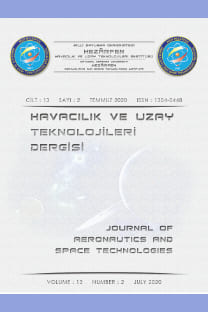Orografik (yere-yakın) alanlar üzerinde zamanla hızlı değişen 3 boyutlu rüzgar girdapları ve bunların uçuş güvenliğine etkileri
The simulation of time-dependent three dimensions (3D) wind vortex which comes into being on orography areas and using of it in the increasing flight safety
___
- [1] Eraslan, A. H., Erhan, İ. H., Lin, W. L. 1981. A Fast Transient, Two-Dimensional, Discrte element Rainfall-Runoff Model, For Channelized, composite Subsurface-Surface Flows In Valleys Steep Terrain, Procedings of the International Symposium on Rainfall-Runoff Modeling held, Mississippi State University, Mississippi State, Mississippi, USA.
- [2] Eraslan, A. H., Ahmadi, G. 1993. A Computer Code For Analyzing Transient Three-Dimensional Rapid Granular Flows In Complex Geometries. Computer Fluids, Vol. 22, No. 1, pp.25-50, USA.
- [3] Eraslan, A. H. 1995. Computationly Challanging Problems in Fast-Transient Multiphase Convective Heat Transfer. American Society of Mechanical Engineering, Energy&Enviromental Expo 95, Housten, Texas.
- [4] Huang Y., Ramaswamy V., Huang X., Fu Q., Bardeen C. 2007. A strict test in climate modeling with spectrally resolved radiances: GCM simulation versus AIRS observations, Geophysıcal Research Letters
- [5] Eraslan, A. H., Lin, W. L., ve Sharp, R. D. 1983. FLOWER: A Computer Code For Simulating Three-Dimensional Flow, Temperature And Salinity Conditions in Rivers, Estuaries and Coastal Regions. Rapor No: NUREG/CR-3172, U.S. Nuclear Regulatory Commission, Office of Nuclear Regulatory Research, Washington, D. C., ve Rapor No.: ORNL/TM-8401, Oak Ridge National Laboratory, Oak Ridge, Tennessee.
- [6] Eraslan, H. A. 2006. Turbulence: Proper Reynolds Transport Theorem Versus Formal Reynolds Decomposition Hypothesis. J. Fluid Mech. (under consideration for publication).
- [7] Eraslan, H. A. 2006. Discretal Theory of Fluid Flow Physics: Toward a Universal Computational Algorithm. Journal of Computational Physics (under consideration for publication).
- [8] Jacob, G., David G. Long, 1994. Mivergence Models for the Near-Surface Oceanic Vorticity and Divergence, Brigham Young University.
- [9] Terra, R., 2002 The impact of orographic variance on boundary layer clouds and its parameterization for climate models, University of California .
- [10] Perlin, N., R.M.Samelson, D. B. Chelton, 2004. Scatterometer and Model Wind and Wind Stress in the Oregon–Northern California Coastal Zone, Oregon State University.
- [11] John, F. S., 2000. Low-Level Topographic Drag in Atmospheric Flows, Post outline,University of Victoria
- [12] Olafsson, H.,2004 Multi-scale Orographic Forcing of the Atmosphere Leading to an Erosion Event, Haskoli Island University.
- [13] Dunja, D., Stiperski I., Tudor M., 2005. Testing The New Sub-Grid Scale Orography Represantation on Bura Cases, Croatian Meteorological and Hydrological Service.
- [14] Lindeman, J., Boybeyı Z., 2006. Orographic Vortex Shedding Comparisons using Different Nested Grid Options in ARW WRF, George Mason University.
- [15] Buss S. , 2006. Orographic Effects, Post Outline.
- [16] Yağan, Y., İpek F., Çamalan İ., 2004.Low Level Wind Shear Alert System, Meteosat Second Generation, Postnote
- [17] Tutar, M. , Celik I. , Yavuz I. , 2006. Modellıng Of Effect Of Inflow Turbulence On Large Eddy Simulatıon Of Bluff Body Flows, Mathematical and Computational Applications.
- ISSN: 1304-0448
- Yayın Aralığı: 1
- Başlangıç: 2003
- Yayıncı: Dr. Öğr. Üyesi Fatma Kutlu Gündoğdu
Uncertainty assessment of aircraft maintenance times
A new multi-frequency vibrational genetic algorithm in radar cross section minimization problems
Erdoğan DUR, HAKAN TEMELTAŞ, Sefer KURNAZ
İnsansız kara araçları ve muharebe gereksinimleri
H. Arsev ERASLAN, M. Boran ÇIĞIRTKAN
Sektörel grid temelli mihverleme yöntemi ve genetik algoritmalarla insansız kara aracı navigasyonu
Kesici takım tedarikçisi seçiminde analitik ağ sürecinin kullanımı
